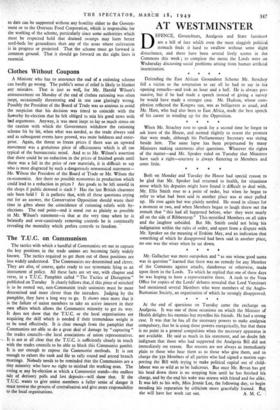AT WESTMINSTER D EFENCE, Groundnuts, Analgesia and State furniture are a
bill of fare whit h even the most sluggish political, stomach finds it hard to swallow without some slight disturbance, and there have been several lively scenes in the Commons this week ; to complete the menu the Lords were on Wednesday discussing social problems arising from human artificial insemination.
* * * * Defending the East African Groundnut Scheme Mr. Strachey fell a victim to the temptation to say all he had to say in his opening remarks—and took an hour and a half. He is always per- suasive, but if he had made a speech instead of giving a survey he would have made a stronger case. Mr. Hudson, whose com- plexion reflected the Kongwa sun, was as belligerent as usual, and Mr. Hare, who had also been to East Africa, made the best speech of his career in winding up for the Opposition.
* * When Mr. Strachey rose to speak for a second time he forgot to ask leave of the House, and seemed slightly to resent the protests that were made, although his Parliamentary Secretary was sitting beside him. The same lapse has been perpetuated by many Ministers making statements after questions. Whatever the rights of the matter—and Mr. Speaker ruled on Tuesday that Ministers have such a right—courtesy is always flattering to Members and costs little.
Both on Monday and Tuesday the House had special reason to be glad that Mr. Speaker had returned to health, for situations arose which his deputies might have found it difficult to deal with. Mr. Ellis Smith rose to a point of order, but when he began to refer to what had been said in another place was at once pulled up. He rose again but was plainly nettled. He stood in silence for a moment or two, and when Members began to laugh threw out the remark that " this had all happened before, whet they were nearly all on the side of Ribbentrop." This mystified Members on all sides and the laughter subsided. But Mr. Smith could not bring his indignation within the rules of order, and apart from a dispute with Mr. Speaker on the meaning of Erskine May, and an indication that something of which he disapproved had been said in another place, no one was the wiser when he sat down.
Mr. Gallacher was more outspoken and " as one whose good name was in question " learned that there was no remedy for any Member of the Commons against attacks, slanderous or otherwise, made upon them in the Lords. To which he replied that one of these days he was hoping to have a representative there. A rush to the Vote Office for copies of the Lords' debates revealed that Lord Vansittart had mentioned several Members who were members of the Anglo- Rumanian Society, an organisation of which he strongly disapproved.
* * * At the end of questions on Tuesday came the exchange on Analgesia. It was one of those occasions on which the Minister of Health delights his enemies but mystifies his friends. He had a strong case. It was that he has all the necessary powers to make analgesia compulsory, that he is using those powers energetically, but that there is no point in a general compulsion when the necessary apparatus is not available. He said as much in his statement, and no doubt felt indignant that those who had supported the Analgesia Bill did not immediately see reason. But reasons are not always as immediately plain to those who hear them as to those who give them, and to charge the 33o Members of all parties who had signed a motion sup- porting the Bill with trying to make political capital out of child- labour was so wild as to be ludicrous. But once Mr. Bevan has got his head down there is no stopping him until he has finished his charge, and by the end his wake was strewn with friend and foe alike. It was left to his wife, Miss Jennie Lee, the following day, to begin mending his reputation by criticism more gracefully framed. But






































 Previous page
Previous page